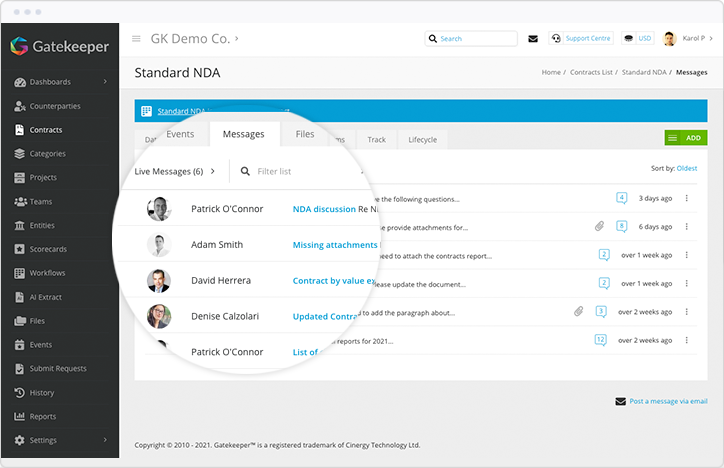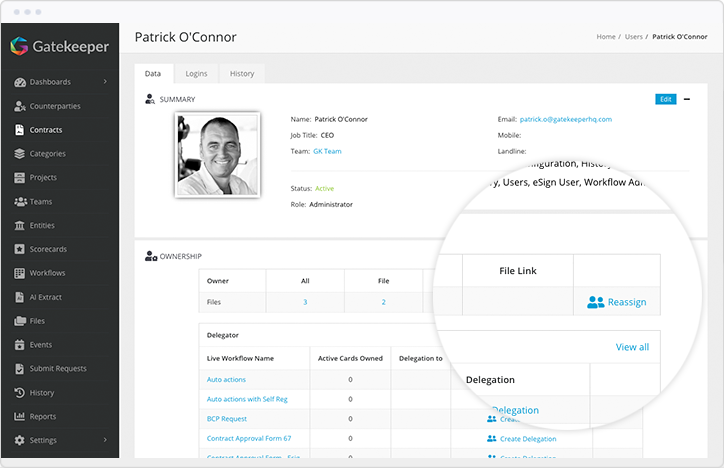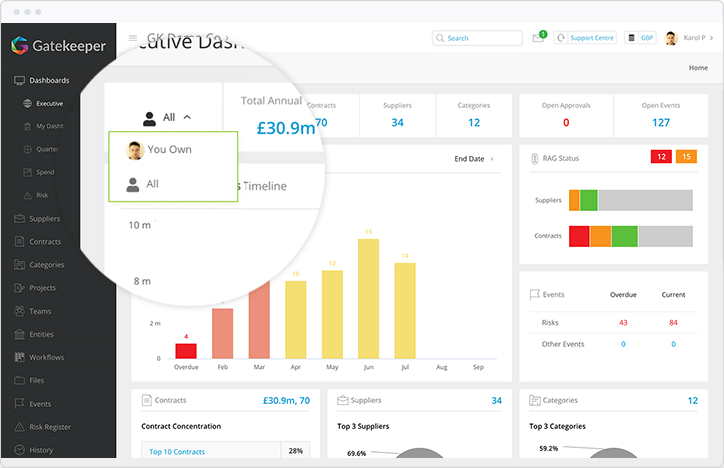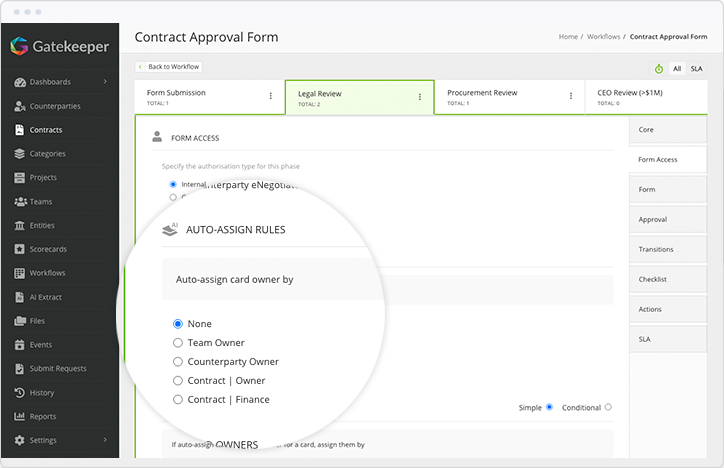Contracts are complex by nature with each stage of their lifecycle requiring a different set of activities. In a scaling organisation, or for an individual who is already balancing multiple priorities, it can be easy for some of the responsibilities relating to a contract to slip through the cracks - whether that’s a key date being missed or levels of risk increasing without anyone knowing.
Assigning ownership to specific parties for agreements designates responsibility to the owner for realising maximum benefits and holds them accountable if contract outcomes aren’t as expected."
In this article, we take a look at why Contract Ownership is crucial to successful contract management and how Gatekeeper can support contract owners, while keeping them accountable for the success of a business’s agreements.
1. Contract ownership brings clarity over accountability
In more mature organisations, it might be a designated contracts manager or procurement specialist with a sole focus on maximising value from agreements. In smaller orgs it might be the manager or executive who signed the contract. Or it might be left by default to the legal team.
Irrespective of who the owner is, a contract will naturally need to be worked on or reviewed by multiple different people during its lifecycle. The pre-signature phase involving negotiation and review requires different stakeholders from latter stages where obligation and performance management are more prevalent.
However, unless there is a single designated person responsible for a contract, it becomes easy for key stages and actions to be missed or deprioritised.
Although departments ultimately work together towards the same contract goal, different priorities during the lifecycle can quickly lead to bottlenecks or breakdowns."
Gatekeeper makes it easy for Contract Owners to track communication about their agreements through its Messaging area, with a complete and auditable history available.
Contract Owners can collaborate with internal departments, stakeholders and external suppliers. Messaging functionality can be accessed from multiple areas, providing Contract Owners even greater control and flexibility for communicating effectively.
 See who has contract ownership at which stage of the lifecycle
See who has contract ownership at which stage of the lifecycle
2. Continual contract ownership prevents a single source of failure
Some businesses may avoid assigning contract ownership to a single individual fearing that they may leave the business. If information about a contract lies solely with a single individual, vital knowledge can be lost if it isn’t shared before they move on.
But shared or poorly-defined contract ownership (as we’ve seen above) can quickly lead to blurred responsibilities and inaccurate or duplicate information - with multiple messages, versions of documents or certificates being gathered from multiple sources.
Businesses not only need to assign contract ownership but they also need to plan for it to be continuous, ensuring that as people leave, their contract responsibilities are passed on to someone else and that the information they receive is accurate and up-to-date."
Gatekeeper supports continuous contract ownership by making it easy to reassign agreements to new owners. As a result, contracts don’t need to fall between the cracks due to staff turnover.
All contracts and any objects, such as Events, owned by the leaver can be reassigned to someone else with a click of a button. If the leaver owns multiple contracts and objects, these can be Bulk Transferred for ease-of-use, preventing any extra work.
 Easily reassign contract ownership if team members change
Easily reassign contract ownership if team members change
3. Contract Owners have complete visibility of their agreements
A Contract Owner is likely to be spinning multiple plates at any one time, with different agreements in different phases of their lifecycle, often as well as having a ‘day job’ to be getting on with. Visibility of where contracts are, how they’re progressing and what actions are required next - such as a contract review or a renewal - is crucial when it comes to effective contract management.
Contract owners need to be proactive when managing a portfolio, quickly view relevant information to make informed decisions and be able to prioritise key contracts or events."
Gatekeeper provides customisable Dashboards and timely reminders that can be tailored around ownership. Contract owners can view the information they need, see which contracts require urgent attention and any upcoming events that they need to plan for. Owners can drill into other data including Suppliers, Categories, RAG Status and Values.
 See contracts you own with 'My Dashboard' from Gatekeeper
See contracts you own with 'My Dashboard' from Gatekeeper
4. Dynamic ownership can eliminate bottlenecks
Gatekeeper uses a Kanban Workflow Engine to create centralised and visual boards so businesses can digitise their processes, easily see what phase a contract is in and identify any bottlenecks.
It’s easy to see who a contract is currently with and what actions need to be taken to progress it further.
Assigning ownership within the workflows holds individual owners accountable for the phase they have responsibility for, which drives workflow action rather than delays."
Dynamic Ownership allows for an efficient workflow where a single phase will automatically allocate the action to the appropriate owner based on the agreed dynamic rules. The Dynamic Owner will be automatically alerted when their attention is required.
 Assign ownership at different stages of the workflow
Assign ownership at different stages of the workflow
5. Contract ownership puts the onus on confidentiality
It’s common for contracts to contain confidential information - whether it’s financial information, details of upcoming projects, pricing or proprietary methods. If information is shared with an incorrect individual or simply left available for anyone to access, share or lose, businesses can face legal action and/or financial penalties.
Assigning ownership to a contract ensures that there is a named custodian of the agreement and its contents, giving them full responsibility for protecting any confidential information."
Gatekeeper helps to protect confidentiality by giving contract owners a secure place to store their contracts and associated data, with the ability to set Role-Based Access Levels too. Any actions taken against a record will also be captured in a comprehensive audit trail, providing visibility of who accessed, edited or shared a record and when.
Wrap Up
Successful contract management relies on clear ownership. This creates accountability and helps to drive action to keep the contract moving forward and to ensure it delivers what’s been agreed.
As we’ve seen above, contract management software like Gatekeeper makes the allocation and tracking of owners straightforward, while simultaneously making the associated tasks and responsibilities of ownership easier to complete.
To discover how Gatekeeper can help you manage contracts successfully, book a demo or contact us today.

.png)
.png)
.png)
-4.png)